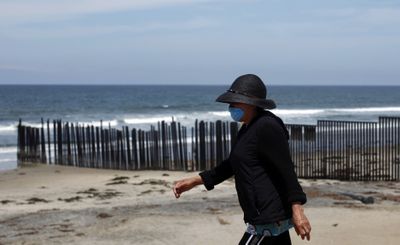Flu virus now seen as on par with norm
U.S. cases no worse than usual, officials say

WASHINGTON – Federal health authorities see “encouraging signs” the new flu outbreak is not as severe as many feared when much of the attention toward “swine flu,” now called the H1N1 virus, focused on deaths in Mexico.
While it still is likely the spreading virus now confirmed in 30 states may claim more American victims – with about 36,000 Americans succumbing to the ordinary seasonal influenza each year – authorities said Sunday the initial cases of H1N1 found in the United States have generally been no more severe than the seasonal flu.
“What I can say is that we’re seeing encouraging signs,” Dr. Richard Besser, acting director of the Centers for Disease Control and Prevention, said on ABC News’ “This Week with George Stephanopoulos.” “That makes us all very happy …”
“When we get a virus, we look to see, does it relate to any other viruses?” Besser said. “And then we look for things that are called virulence factors, those things that in the past have been linked to more severe disease. And what we’ve found is that we’re not seeing the factors that were associated with the 1918 pandemic” that claimed millions of lives.
Besser delivered a similar message on the other Sunday morning news shows, repeating the “encouraging signs” authorities are finding about a disease confirmed in 245 people in the U.S. as of Sunday – up from the 20 cases reported last Monday morning, when President Barack Obama first declared publicly there was cause for “concern,” but not alarm.
The World Health Organization on Sunday reported 1,000 confirmed cases of the disease in 19 nations. With 568 of the cases in Mexico, that nation also has confirmed 22 deaths, all but one of the world’s reported deaths from the disease, the WHO reports.
“It’s a rapidly evolving situation, and it’s still one cloaked in uncertainty,” Besser said on CBS News’ “Face the Nation.” But “we’re starting to see encouraging signs.”
“Here,” Besser said on “FOX News Sunday,” “we’re seeing encouraging signs that this virus so far is not looking more severe than a strain that we would see during seasonal flu. And so I still expect that this will have significant impact on people’s health, but so far the signs are that it is not more severe than what we’ve seen in a seasonal flu.”
Nevertheless, with one swine-flu death reported in the U.S. – that of a toddler from Mexico who traveled to Texas with his family – Besser said it still is likely the U.S. will see additional deaths. “You would expect that there will be hospitalizations and unfortunately there will be more deaths,” he said on CBS.
“The early news seems to be cautiously optimistic,” said Kathleen Sebelius, the new secretary of Health and Human Services, appearing alongside Besser and Homeland Security Secretary Janet Napolitano on the Sunday morning shows and adding: “We certainly can’t get complacent.”
“I think that we will” find more deaths in the U.S., said Napolitano, who has served as the Obama administration’s leading spokeswoman on the government’s response to the disease. “But the good news is,” she said on “Face the Nation,” “when we look at this virus right now, we are not seeing some things in the past that have been associated with more serious flu.”
The government is proceeding with the manufacture of a new vaccine for the new strain of H1N1 virus, while also building up its stockpiles of vaccine for the seasonal flu expected in the fall.
“We’ll be ready for both,” Sebelius said on NBC News’ “Meet the Press.” “We want to be out ahead of this.”
Asked if the government has overreacted to the outbreak of the new flu, Sebelius said. “We don’t know. … What’s important is that we are aggressively reacting to what the science is telling us.”